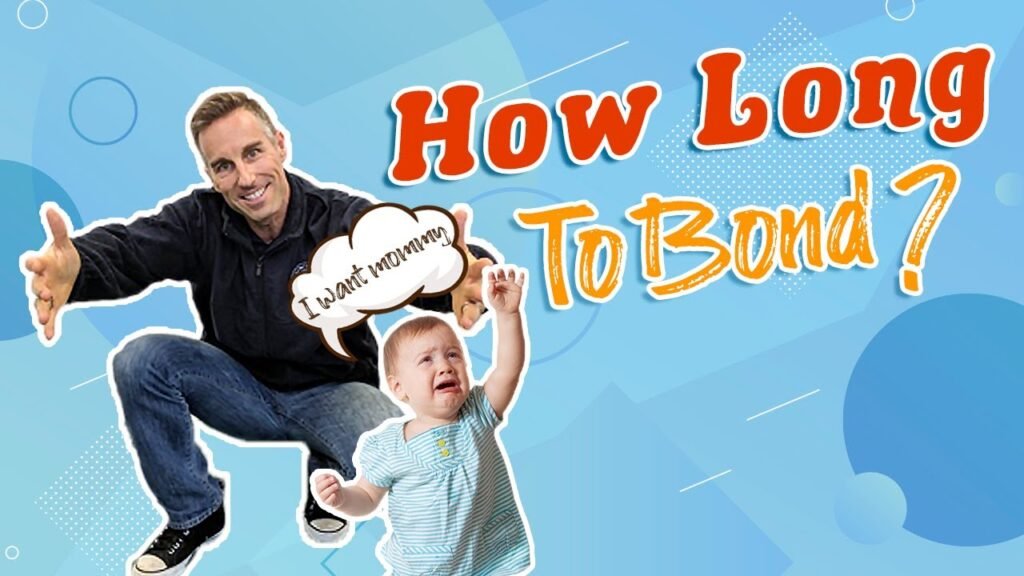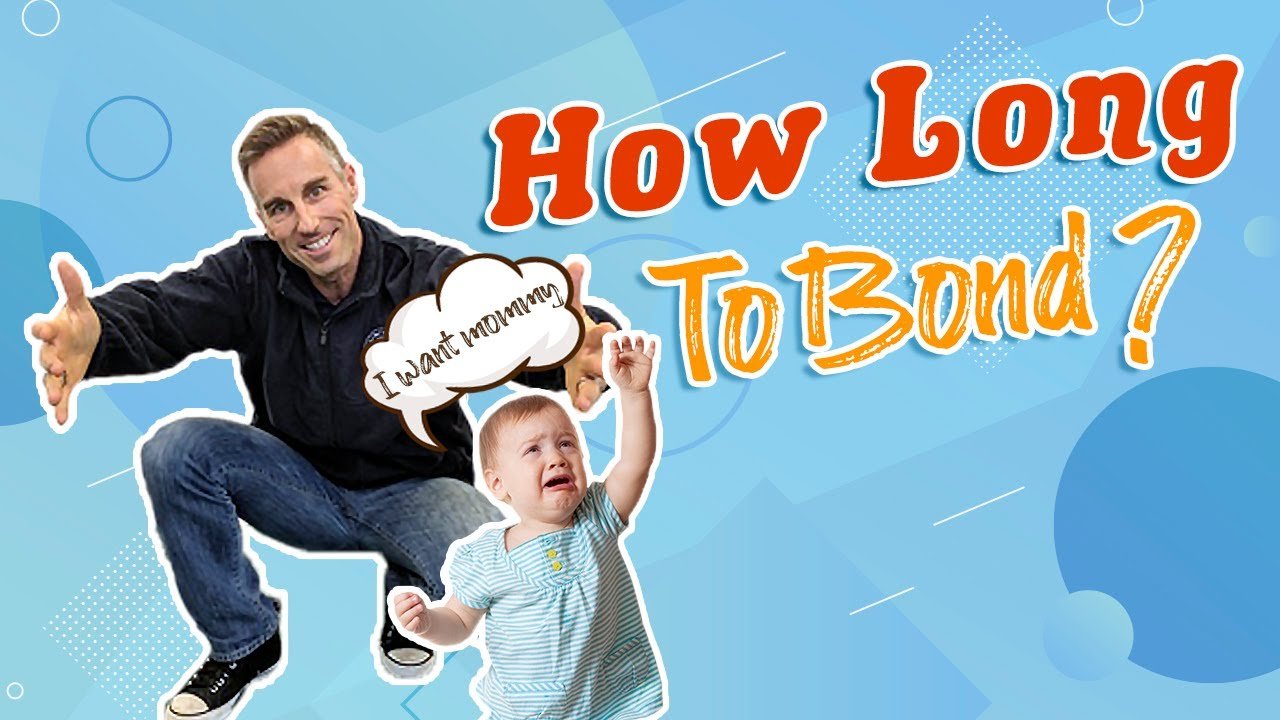In “How Long Does It Take To Bond With The Baby?” video by Dad University, Jason shares his own experience and struggles in bonding with his newborn. As fathers, we often have high expectations that we should immediately feel that close connection with our newborn child. However, it’s important to remember that the mother has already spent 9 months with the baby inside her and has many more intimate moments if she is breastfeeding. Bonding takes time, and it’s completely okay if it doesn’t happen right away. Spending quality time with your baby is key, and eventually, you will start to feel that closeness. So, don’t worry if it doesn’t feel real at first, but as you see the bump grow and feel the baby kick, those moments can make it feel more tangible. Be sure to subscribe to Dad University for more helpful videos just for dads!

Understanding the Challenges of Bonding
Bonding with a baby is an important aspect of a father’s journey, but it can also present its own set of challenges. As a dad, you may have expectations of immediately feeling a close bond with your newborn child. However, it’s important to recognize that bonding is a process that takes time and effort. Additionally, comparing yourself to the mother’s bond can only lead to unnecessary pressure and feelings of inadequacy. Instead, focus on spending quality time with your baby, as this is crucial for developing a strong bond.
Factors Affecting Bonding Time
Several factors can influence the bonding process between a father and their baby. Understanding these factors can help you navigate them and adapt your approach accordingly.
Length of Pregnancy
If you’re eight weeks into the pregnancy, it’s important to remember that it is still early on in the bonding process. You may not yet feel a deep emotional connection with the baby, and that’s perfectly normal. As the pregnancy progresses, and you start to witness physical changes, such as the baby bump and feeling them kick, the bond can begin to feel more real and tangible.
Type of Birth Experience
The type of birth experience can also impact the bonding process. If you were able to be present and actively involved during the birth, it may facilitate a stronger initial bond. However, if you were unable to be present, or if the birth was traumatic or complicated, it might take some time to build that connection with your baby.
Physical Health of the Baby
The physical health of the baby can also play a role in bonding. If your baby has any health concerns or complications, it’s natural to feel anxious or worried. This can sometimes make it harder to form an immediate bond. However, with time, as you navigate through these challenges together, the bond can strengthen.
Emotional Well-being of the Parent
Your own emotional well-being can greatly impact your ability to bond with your baby. It’s essential to take care of your mental and emotional health, as any stress or feelings of discomfort can hinder the bonding process. Seeking support from your partner, friends, or professionals can be beneficial in maintaining your well-being and fostering a strong bond with your baby.
Timeline for Bonding
Bonding with your baby is not a linear process, but rather a journey that unfolds over time. Understanding the different stages of bonding can help you navigate and appreciate each chapter.
Early Bonding Experiences
In the early stages, you may not feel an instant bond with your baby. This is completely normal and doesn’t reflect on your ability to be a loving and dedicated father. Remember that every individual’s bonding timeline is unique, and you will find your own rhythm.
First Few Weeks After Birth
The first few weeks after birth can be overwhelming for both you and your baby. Adjusting to the new routines and responsibilities can be challenging, but it’s during this time that bonding can begin to take shape. Spending time holding, cuddling, and soothing your baby can help create a sense of security and trust.
First Few Months of the Baby’s Life
As the first few months pass by, you’ll likely start to notice the bond deepening. Your baby’s responses and reactions to you will become more apparent, and you’ll find joy in their smiles and laughter. This is a critical time for bonding, and actively engaging in activities and playtime can further strengthen your connection.
Building a Bond with the Baby
There are several strategies and practices that can help foster a strong bond between you and your baby. These methods are simple yet powerful in creating a nurturing environment for your relationship to flourish.
Skin-to-Skin Contact
Skin-to-skin contact provides numerous benefits for both you and your baby. Holding your baby against your bare chest helps regulate their body temperature, heart rate, and breathing. It also promotes the release of oxytocin, a hormone associated with bonding and feelings of love.
Eye Contact and Talking to the Baby
Engaging in eye contact with your baby and talking to them can help establish a sense of connection. Babies are highly responsive to facial expressions and the sound of their parents’ voices. By maintaining eye contact and gently speaking to your baby, you’re actively involving them in conversation and making them feel valued and understood.
Feeding and Diaper Changing
Feeding and diaper changing routines present excellent opportunities for bonding. Whether you’re bottle-feeding or assisting with breastfeeding, these moments of closeness and nurturing provide not only physical nourishment but also emotional closeness. Use this time to establish eye contact, talk softly, and embrace the bonding experience.
Engaging in Play and Activities
Engaging in playtime and activities with your baby is not only enjoyable but also crucial for bonding. As your baby grows and develops, they will start to explore their surroundings and respond to stimuli. Join in on their playtime by singing, dancing, and playing with toys. This shared experience promotes a sense of joy and togetherness.
Emotional Connection and Attachment
Bonding with your baby goes beyond physical interactions. It’s about developing a deep emotional connection and creating a secure attachment. Understanding the signs of bonding and nurturing a secure attachment are vital for your baby’s well-being and your own fulfillment as a father.
Recognizing Signs of Bonding
Some signs that indicate you’re forming a bond with your baby include feeling protective, experiencing a strong desire to care for them, and finding joy in their presence. You may also notice increased sensitivity to their needs, such as being able to distinguish different types of cries and responding accordingly.
Creating a Secure Attachment
A secure attachment is built on consistent love, care, and emotional responsiveness. By being present, attentive, and sensitive to your baby’s needs, you are actively fostering a secure attachment. This creates a foundation of trust, which is essential for healthy emotional development.
Feeling a Deep Emotional Connection
Over time, as you invest in your relationship with your baby, you will begin to feel a deep emotional connection. This can manifest as an overwhelming sense of love, protectiveness, and an innate understanding of your baby’s unique personality and needs. Embrace and nurture this connection as it strengthens your bond.
Challenges in Bonding
While bonding with your baby is a beautiful and rewarding experience, it can also come with its fair share of challenges. Understanding and addressing these challenges is crucial for creating a nurturing environment for both yourself and your baby.
Postpartum Depression
Postpartum depression is a condition that can affect both mothers and fathers. It can impact your ability to bond with your baby and can create feelings of detachment or sadness. If you suspect you or your partner may be experiencing postpartum depression, it’s essential to seek professional help and guidance.
Lack of Support
Feeling isolated or lacking support can make it more difficult to bond with your baby. Reach out to your partner, family, friends, or support groups for fathers to create a network of support. Surrounding yourself with understanding and empathetic individuals can make a significant difference in your bonding journey.
External Stressors
External stressors, such as work pressure or financial concerns, can impact your ability to fully engage in the bonding process. It’s important to actively manage these stressors and create a healthy work-life balance that allows you to prioritize your baby and the bond you’re building.
Seeking Help and Support
Remember, it’s perfectly normal to seek help and support when faced with challenges in bonding. Here are some avenues to consider:
Talking to a Healthcare Provider or Therapist
If you’re struggling to bond with your baby or experiencing emotional difficulties, don’t hesitate to reach out to a healthcare provider or therapist. They can provide guidance, support, and strategies to navigate the challenges you may be facing.
Joining Support Groups for Fathers
Support groups specifically designed for fathers can be instrumental in connecting with others who are going through similar experiences. Sharing your thoughts and concerns with individuals who can relate can provide a sense of comfort and understanding.
Engaging in Couples Counseling
Bonding with your baby is often a collaborative effort with your partner. Engaging in couples counseling can strengthen your bond as a couple and help navigate any challenges or conflicts that may arise during the bonding process.
Tips for Dads to Bond with the Baby
Here are some practical tips to help dads bond with their baby:
Scheduling One-on-One Time with the Baby
Designate specific times dedicated solely to spending one-on-one time with your baby. Whether it’s engaging in playtime, going for a walk together, or simply cuddling, these moments of undivided attention can create powerful connections.
Participating in Caregiving Tasks
Taking an active role in caregiving tasks, such as feeding, bathing, and changing diapers, provides ample opportunities for bonding. It allows you to be involved in your baby’s daily routine and fosters a sense of closeness and trust.
Being Present and Engaged
Being present and engaged during interactions with your baby is crucial. Put away distractions and give your full attention to your little one. This shows them that they are valued and loved, and it also deepens your connection.
Taking Care of Yourself
Don’t forget to prioritize self-care. Taking care of your physical and mental well-being is essential to being fully present and available for your baby. Make time for activities you enjoy, seek support when needed, and ensure you are in a good place emotionally.
The Importance of Patience and Persistence
Bonding with your baby is a journey that takes time, and it’s important to approach it with patience and persistence. Understand that bonding is a gradual process, and each bond is unique. Embrace the small moments and incremental progress, knowing that your efforts will pay off in a deep and lasting bond.
Conclusion
Bonding with your baby is an incredible and deeply fulfilling experience. It’s important to recognize the challenges that may arise along the way, but also the immense joy and connection that awaits. Remember, each father’s journey is different, and there is no one-size-fits-all approach to bonding. Prioritize spending quality time with your baby, seek support when needed, and cherish the moments that strengthen your bond. With time, patience, and persistence, your bond will blossom and flourish, creating a foundation of love and connection that will last a lifetime.

